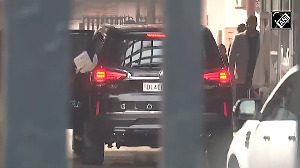India today told the WTO it is ready for another go at reaching a world trade agreement, talks for which were initiated in Doha seven years ago, if the flaws in multilateral rules are removed.
"If the basis of the round (Doha negotiations) has to see a change in its very objectives, it would be tough going for global trade integration," Commerce and Industry Minister Kamal Nath said in New Delhi in the presence of WTO Director General Pascal Lamy.
Also see: India and the WTO: News & Issues
Nath, who was sharing the dais with Lamy at a CUTS-FICCI conference on global development goals, said "revival of the weakest" and "not survival of the fittest" should form the core of the negotiations for reaching an agreement.
Otherwise, a renewed attempt being made by Lamy and others to bring the talks back on rail could meet the fate of the recently abandoned talks in Geneva. While India is keen on resuming multilateral negotiations, it cannot be expected to accept the flaws -- the price developing countries are being asked to pay for developed countries to cut subsidies, he said.
Nath was responding to Lamy's remarks that if WTO cannot reach a deal, the US agricultural trade distorting subsidies could see a sharp jump to over $ 48 billion dollars from a ceiling of $ 14.5 billion, which the Bush administration had offered at the Geneva Mini-Ministerial Meeting.
If the Round was not to conclude, "the US will be able to spend much more (on subsidies)," Lamy said.
Within two weeks of the collapse of Geneva talks, the WTO chief is in New Delhi on a two-day visit seeking India's help to revive the negotiations.
Lamy's schedule includes meetings with Prime Minister Manmohan Singh and Nath, besides interaction with industry bodies like FICCI and CII and civil society organisations like CUTS International. The WTO chief said the success of the Doha Round can result in worldwide duty cuts of $ 150 billion a year. Two-third of these cuts would be expected from the rich nations. In other words, this would be the level of market access for the developing countries.
However, he agreed that the present food crisis is also a result of the lack of investment in developing countries. "One of the reasons for decline in production is the trade distorting subsidies and high tariffs in the rich countries." In his remarks, Nath said the devil lies in the details of the proposals being put on the negotiating table. "If the EU says we are going to reduce tariffs for airplanes, what does it mean for India and Africa," he asked at the meeting, which was also attended by several diplomats from Africa.
Sending a signal to the American negotiators that India would fully leverage the issue of high cotton subsidies in the negotiations, Nath said: "I want to import cotton from Africa. But if there is 40 per cent subsidy in the US, my industry is not going to buy it from Africa."
Nath was supported by Secretary General of the United Nations Conference on Trade and Development Supachai Panitchpakdi. "I would have thought cotton would have become a goodwill case... cotton must be tackled seriously," the UNCTAD chief said.
Elaborating on the reasons behind the failure of the negotiations between the 30 trade ministers, Nath said India could not have accepted a remedy against import surges with several strings attached.
Differences over the level of the Special Safeguard Mechanism between the US and India proved to be a deal-breaker in Geneva.
While developing countries are now seeking a safeguard mechanism to protect their farmers, "I learnt that developed countries had already been using it for the last 14 years," Nath said.
He said India wanted a "reasonable (SSM) figure" and "it must have a reasonable remedy," adding that while he was ready to negotiate "numbers," he could "not negotiate attitude and mindset."






 © 2025 Rediff.com -
© 2025 Rediff.com -